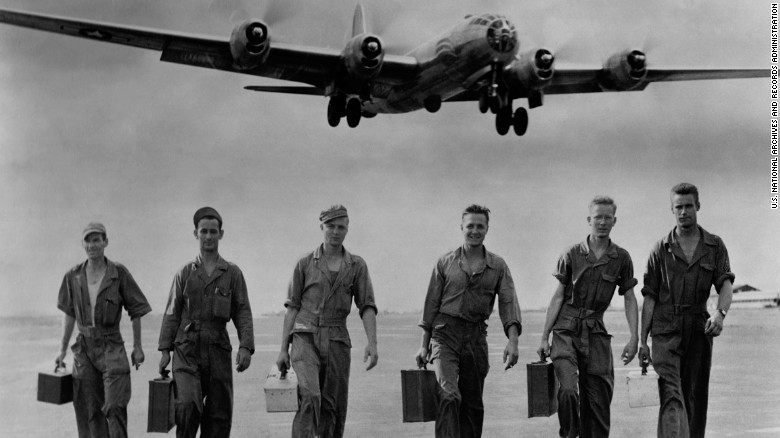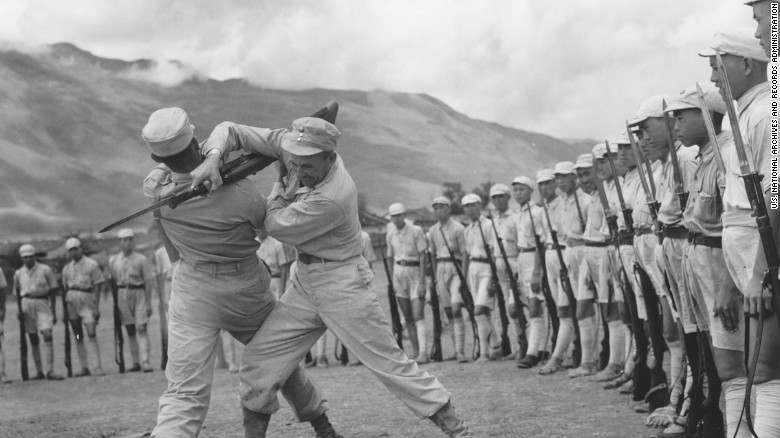
 China was the first country to enter what would become the Second World War, and it was the ally of the United States and the British empire from just after Pearl Harbor in 1941, to the Japanese surrender in 1945. Yet today, China's memory of the war is becoming more, not less, important, as we move further away from it.
China was the first country to enter what would become the Second World War, and it was the ally of the United States and the British empire from just after Pearl Harbor in 1941, to the Japanese surrender in 1945. Yet today, China's memory of the war is becoming more, not less, important, as we move further away from it. And many in China are becoming resentful that the West fails to remember that China was itself a significant player in the eventual Allied victory.
Chinese suffering during the war is not in dispute. Some 14 million Chinese died and up to 100 million became refugees during the eight years of the conflict with Japan from 1937 to 1945. But overall, was the Chinese contribution to the war really so important? Consider a "what if" scenario.
On July 7, 1937, a clash between Chinese and Japanese troops at the Marco Polo Bridge, just outside Beijing, led to all-out war. A year later, by mid-1938, the Chinese military situation was desperate.
Most of eastern China lay in Japanese hands: Shanghai, Nanjing, Wuhan. Many outside observers assumed that China could not hold out, and the most likely scenario was a Japanese victory over China.
Nonetheless, China's leader, the Nationalist Chiang Kai-shek, along with his unlikely allies, the Communists, refused to surrender, retreating inland to carry on resistance.
This decision changed the fate of Asia.
If China had surrendered in 1938, Japan would have controlled China for a generation or more. Japan's forces might have turned toward the USSR, Southeast Asia, or even British India.
The European and Asian wars might never have come together as they did after Pearl Harbor in 1941.
Global war
Yet the Chinese hung on, and after Pearl Harbor, the war became genuinely global. The western Allies and China were now united in their war against Japan.
The relationship between the two sides became closer but was also subject to many misunderstandings.
China was treated as one of the Allies.
However, the country had far fewer resources than the other Allies, and this led a real divergence in the viewpoints of the west and China toward the Chinese contribution to the war.
Western Allies valued the fact that the Chinese resistance was holding down 600,000 or more Japanese troops.
In the early part of the war, this meant that those troops could therefore not be transferred to the rest of Asia easily. Yet the U.S. and Britain knew they had to prioritize their goals.
Liberating Europe from the Nazi terror ("Europe first") was the priority, not least because Stalin insisted that the western Allies must provide relief for the Soviets.
However, the Chinese had a rather different view of the issue.
For the Nationalists and Communists, the war had begun in 1937 and they had been, in their own words, "first to fight."
It was true that China's armies were weak, but many of the best troops had been sacrificed in major battles such as Shanghai and Xuzhou.
China felt it was being asked to bear the burdens of a major ally without the finances or resources that the U.S., Britain or even the USSR could call on.
To be clear, China could not have won the war on its own. The defeat of Japan was dependent on western, and in particular, American finance, military support and supplies (although western ground troops did not fight in China). The Allies had to husband their limited resources, and it was reasonable to put Europe first.
But acknowledging these realities does not mean denying that China's contributions were also very important to the war effort. China held down huge numbers of Japanese troops on its territory.
It acted as an example to other non-Western countries, showing that it was possible to fight with the west and still strongly oppose imperialism (Chiang Kai-shek tried to persuade the Indian nationalists, Nehru and Gandhi, actively to back the war effort, although he was ultimately unsuccessful).
Much of this story was forgotten in the West and China during the Cold War.
Few wished to remember the regime of Chiang Kai-shek, which had been driven onto Taiwan by Mao Zedong's Communists.
In Mao's China, the Communist Party had little interest in providing any space for positive reflections on the wartime contributions of their Nationalist enemies.
Only from the 1980s, when the Cultural Revolution had been discredited, and a new source of nationalism was needed, did the Chinese authorities allow a more broad-based reassessment of the war, rehabilitating the contribution of the Nationalist government and the troops who had fought for it.
Today, China has explicitly embraced huge swathes of its war history that remained taboo during much of the Cold War.
It has been explicitly stated that Communist and Nationalist veterans will both be honored during this year's ceremonies.
Yet there are also signs that the memory of the war will be used to make a case for changing geopolitics in the region.
China is increasingly resentful of the U.S.' role in Asia, arguing that if American contributions to the defeat of Japan in 1945 entitle it to a continuing presence in the region, then China's own sacrifices also grant it a role.
In Asia, unlike Europe, World War II is still unfinished business.